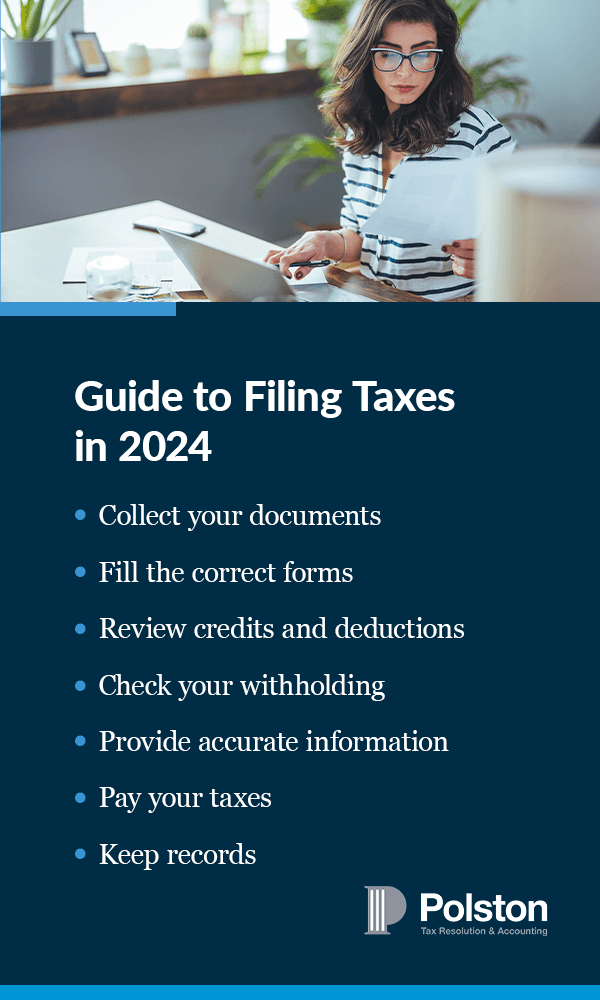
100+ Years of Combined Tax Resolution Experience.
100+ Years of Combined Tax Resolution Experience.
As you start preparing documents to file your taxes, you must be up to date on the latest updates. Navigating the 2024 tax season starts with considering the new adjustments in tax brackets and how they can affect you.
While tax returns aren’t due until the middle of April, the Internal Revenue Service (IRS) will accept submissions from early January. By taking a proactive approach and being informed and diligent in the 2024 tax season, you can optimize your financial outcomes and stay compliant with tax laws. Use this guide to find important information and confidently prepare for the new tax season.
Table of Contents
Overview of Tax Season 2024
It is important to note the difference between tax year and tax season. The tax year is when you earn an income, making you responsible for paying income taxes. Tax season is the time to file your taxes for the last tax income year. Tax brackets for the 2023 tax year are:
| MARGINAL TAX RATES | SINGLE TAX BRACKET | MARRIED FILING JOINTLY | HEAD OF HOUSEHOLD | MARRIED FILING SEPARATELY |
|---|---|---|---|---|
| 10% | $0–11,000 | $0–22,000 | $0–15,700 | $0–11,000 |
| 12% | $11,000–44,725 | $22,000–89,450 | $15,700–59,850 | $11,000–44,725 |
| 22% | $44,725–95,375 | $89,450–190,750 | $59,850–95,350 | $44,725–95,375 |
| 24% | $95,375–182,100 | $190,750–364,200 | $95,350–182,100 | $95,375–182,100 |
| 32% | $182,100–231,250 | $364,200–462,500 | $182,100–231,250 | $182,100–231,250 |
| 35% | $231,250–578,125 | $462,500–693,750 | $231,250–578,100 | $231,250–346,875 |
| 37% | Over $578,125 | Over $693,750 | Over $578,100 | Over $346,875 |
Deductions and Credits
Tax deductions can help to lower your taxable income, while tax credits are the dollars subtracted from your tax bill. If your credit is more than the amount of tax you owe and is refundable, you will receive a refund. Nonrefundable credits will only reduce your tax liability to zero. Potential deductions and credits you need to consider include:
- Charitable deductions: You can deduct up to 60% of your charitable donations from your adjusted gross income for the 2023 tax year.
- Business deductions: The home deduction only applies to self-employed people. This is also an opportunity for business owners to claim deductions on their tax returns.
- Medical deductions: You can get some tax relief from your out-of-pocket medical expenses in 2023 by claiming above 7.5% of your adjusted gross income (AGI).
- Earned income tax credit (EITC): Low- and middle-income households can claim the EITC if they meet the qualifying criteria. The EITC can be as much as $7,430. Single filers with no children must have an AGI of less than $17,640, and married couples with three or more children are capped at $63,398.
- Education credit: The American Opportunity Tax Credit (AOTC) lets you claim up to $3,500 per student, whether for yourself or your dependents.
- Child tax credit (CTC): The CTC allows for tax credit up to $2,000 per child dependent under the age of 17. Married couples filing jointly have an income limit of $400,000 and $200,000 for separate filing.
- Child and dependent care credit: This credit lets you offset some caregiving, daycare and babysitter costs for your dependents.
1099-K Changes
The new 1099-K policies are delayed, so no immediate changes are coming to your upcoming tax season if you sell goods or services online. These changes will only take effect in 2025.
Important Tax Changes
Staying updated on tax amendments is vital, whether you are filing as an individual or a business. The new tax rules for the 2024 tax season can shape your financial strategies, influence your decision-making processes and impact your personal finances or corporate structures.
Higher Standard Deductions
The standard tax deduction for tax year 2023 increased. For single filers and married people filing separately, the standard deduction is $13,850. It’s $27,700 for jointly filing married couples and $20,800 for heads of households.
Alternative Minimum Tax (AMT) Exemption Increase
The AMT tax system helps to ensure that high-income taxpayers pay a minimum tax amount. High earners may need to use AMT rules rather than standard rules to calculate their tax obligation. For taxes due in 2024, the exemptions and phase-out amounts increased to:
| Single filers | Married Filing Jointly | Married Filing Separately | |
|---|---|---|---|
| Exemption Amount | $81,300 | $126,500 | $63,250 |
| Exemption Phase-out Amount | $578,150 | $1,156,300 | $578,150 |
Inflation Reduction Act Credits
For the 2024 tax season, several new tax credits launched in association with the Inflation Reduction Act. These credits include a credit of up to $7,500 for individuals who purchased new clean vehicles in 2023 and credits for making energy-efficient home improvements.
Deductions for 401(k), 403(b) and IRA Contributions
401(k) and 403(b) contributions are not tax-deductible at the time of filing. Because these contributions are made with pre-tax dollars, they’re already excluded from a taxpayer’s taxable income and don’t qualify for additional deductions.
Roth IRA contributions are not tax-deductible. Contributions to a traditional IRA may be tax-deductible. If you or your spouse are part of an employer-sponsored plan, your IRA deductions may be reduced based on your income:
- Single: If your income is under $73,000, you get a full deduction. You can take a partial deduction for incomes between $73,00 and $83,000. If you make over $83,000, the deduction phases out entirely.
- Married and filing jointly: For an income under $116,000, you get a full deduction. The deduction is partial for incomes between $116,000 and $136,000. Any income over $136,000 will not benefit from the deduction.
- Married but filing separately: If you are married but filing separately, you cannot get a full deduction. You can get a partial deduction if you make less than $10,000. Anything over that amount will not receive the deduction.
Noteworthy Mentions
In addition to tax changes affecting most Americans, there are several minor changes. These changes include:
- Annual gifts exclusion: Single filers can gift $17,000 without getting hit with a gift tax. For married couples filing jointly, the limit is $34,000.
- Beneficiary exclusion increase: Beneficiaries can exclude $12,920,000 of a decedent’s estate.
- Transportation fringe benefit: The monthly limitation for qualified transportation fringe benefits is $300. Employers offer this tax-free benefit.
- Foreign-earned income exclusion: Foreign-earned income exclusion also increased in the 2023 tax year. U.S. citizens who worked outside the country can exclude $120,000 from their income earned in foreign countries.
- Unemployment benefits: You need to pay taxes on any unemployment benefits received in the last tax year. These amounts are reported on Form 1099-G.
Guide to Filing Taxes in 2024
When is tax season 2024? The deadline for filing your federal tax returns and making tax payments is April 15, 2024. If you request an extension, the last day of tax season 2024 is October 15, 2024. Follow these steps to file your taxes in 2024 for an accurate and smooth process:
- Collect your documents: You should get your W-2 from your employer by the end of January. Freelancers’ clients will each send a 1099 form. Additional tax forms you need include investment income statements, receipts for deductions, mortgage interest statements and charitable contribution statements.
- Filing method: You can file your taxes by using tax software or enlisting a tax professional. Ensure you use the correct forms, like 1040 for individual income tax. You can also submit your tax return via e-filing, which often facilitates faster processing and refunds.
- Review credits and deductions: You can lower your tax liability through eligible credits and deductions.
- Check your withholding: Use the IRS Withholding Estimator to check if your withholding needs any adjustment. These changes will reflect on your W-4 and can help to avoid unwanted tax surprises.
- Provide accurate information: Always double-check the information you provide the IRS. Mistakes in personal information, deductions and income details can lead to delays and tax return issues.
- Pay your taxes: Various tax payment methods are available to help you pay owed tax promptly. Paying promptly helps you avoid interest or penalties for late payment.
- Keep records: Keep copies of your supporting documents, receipts and filed tax returns. These are helpful for potential disputes or future audits — the IRS recommends you keep documents for three to seven years.
Forms Needed to Complete Your Return
You might need to gather a few forms come tax season. From your W-2 to various 1099s, you’ll likely have much to keep track of. Depending on your financial circumstances and activities, these forms and some additional ones may apply. While not all of these forms apply to every tax filer, common tax forms you might need include:
- W-2: Your employer sends you this form, which reflects your earned wages.
- 1099-B: If you sold any stock in the last tax year, your broker will send you this form.
- 1099-DIV or 1099-INT: If you received dividends or earned any interest income over $10, your investment manager sends you this form.
- 1099-G: You’ll get this form if you received unemployment benefits.
- 1099-K: This form reports income earned from credit card payments, prepaid cards, debit cards or from a third-party processor. These sources include Venmo, PayPal or CashApp, if the payments exceed $20,000 over 200 transactions.
- 1099-MISC: This form reports rental income or other miscellaneous income, excluding self-employment.
- 1099-NEC: If you were self-employed or received other nonemployee compensation, you can expect to receive this form from whoever compensated you.
- 1099-R: If you received distributions from an IRA or other retirement plan, your account administrator will send this form.
- 1099-SA: This form reports distributions from your health savings account.
Understanding Your Refund
In straightforward cases, after processing your tax return, the IRS will issue your refund within 21 days. To avoid delays, ensure that your documents are accurate and transparent. Provide the correct personal information, deductions you want to claim and precise income reports.
You can opt for e-filing or a direct deposit to speed up your refund process. In-person filing and opting to receive your check by mail might cause additional delays. You can also monitor your refund status on the IRS website or mobile app.
How a Tax Attorney Can Help
Using a tax attorney to help you file your 2023 taxes can give you peace of mind with comprehensive guidance. They can help ensure you adhere to tax laws and use all the relevant tax credits. A tax attorney can also be beneficial in several other ways:
- Planning and compliance: With their unique insight, a tax attorney offers strategic planning advice to ensure you stay compliant. This planning is especially helpful with complex tax laws, changes and regulations.
- Complex tax matters: Business owners, high-net-worth individuals and anyone facing tax-related legal challenges can benefit from a tax attorney’s advice.
- Legal counsel: A tax attorney offers legal counsel on interpreting tax laws and mitigating penalties or potential risks in various tax matters.
- Audit representation: If the IRS audits you or you have a dispute, your tax attorney can represent you, offering assistance in appeals and negotiations.
- Advice and strategy: With their help, you can get a tailored tax strategy to identify credits or deductions, minimize liabilities, and optimize your financial planning for the new tax year.
If you are unsure about hiring the services of a tax attorney, you may benefit in the following situations:
- Starting or running a business: Consider getting a tax attorney if you started or ran a business in the last tax year. The Federal Income Tax System can be complex, and hiring a professional to help you navigate your taxes can help you stay compliant and avoid unnecessary payments.
- Nonprofits: Tax attorneys can help nonprofit organizations get a section 501(c)(3) status. This status gives organizations like private schools, foundations, churches and charities tax exemptions.
- Tax fraud investigations and failure to pay taxes: If you are under investigation, hire a tax attorney to help you settle your tax balance and negotiate payment options.
- Probate matters and estate tax returns: Tax attorneys can help with navigating probate matters, resolving estate disputes and asset distribution. They can also assist in filing estate tax returns while staying tax-compliant.
Polston Tax Can Help You in the 2024 Tax Season
Educate yourself about essential tax changes that may impact your filing before the 2024 tax season begins. You can streamline your tax filing process by organizing your financial documents, seeking professional guidance, and using the deductions and credits available.
If you need help filing your 2024 tax return or owe back taxes from unfiled returns or previous taxes, we can help. Since 2001, Polston Tax has offered small business tax accounting and resolution services. Contact us today for a free consultation or assistance with your 2024 tax season queries, or call us at 844-841-9857 for more information.
Additional Readings

To keep a small business running smoothly, you need a tax professional. They not only make sure you remain compliant with all tax regulations, but they are also a valuable resource when business owners become entangled with problems. When operating a small business, payroll is one of the largest operating costs and one of the biggest...

We’re in an era in which more small businesses are launching like wildfire. Recent studies showed that 17 million new small businesses were expected to launch in a single year. Small businesses are the backbone of the economy. But they’re often more tumultuous, have fewer resources, and are run by less experienced professionals. If you...

This month’s closed case round up features a company that had potential to grow but was stumped by back taxes and a client whose accountant forgot a 0 on their tax return which created a large tax liability for the client.

The world of tax laws is a complex maze, and the IRS statute of limitations is your guide. It tells you how long the IRS has to audit your tax returns and collect any money you might owe. Knowing this timeframe is essential. It’s your protection against the IRS coming after you years down the...

If you and the Internal Revenue Service (IRS) disagree on an outcome or decision involving your tax matter, you can legally appeal their decision. IRS tax appeals allow you to state your case to the IRS appeal division for another evaluation. Whether you need to dispute a tax penalty, assessment or other decision from the...

One of the keys to business success is understanding the tax rules and how they apply to or affect your company. In states where marijuana is legal for medical or recreational use, there are usually special taxes that apply to the sale of the drug. If you’re considering opening a dispensary or own one already,...




